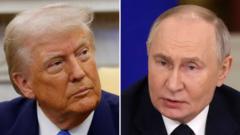Despite backing down from a comprehensive ceasefire proposal discussed in Saudi Arabia, Putin's conditions for peace may complicate future negotiations, while Ukraine remains open to partial agreements under certain terms.
Putin Declines Full Ceasefire in Ukraine, Agrees to Energy Attack Pause Following Trump Call

Putin Declines Full Ceasefire in Ukraine, Agrees to Energy Attack Pause Following Trump Call
In a recent call with US President Donald Trump, Vladimir Putin has only agreed to suspend attacks on Ukraine's energy infrastructure, but has refused to commit to a full ceasefire.
In a high-stakes call between Vladimir Putin and Donald Trump, the Russian leader has declined to accept a full ceasefire in Ukraine, agreeing only to a pause in attacks on energy infrastructure. This decision comes amidst ongoing tensions and military actions in the region, as both sides attempt to navigate the complexities of the ongoing conflict.
President Trump had previously coordinated a month-long ceasefire proposal with Ukrainian officials during discussions in Saudi Arabia. However, during their call, Putin dismissed the idea of a complete truce, stating that it could only materialize if Western military support and intelligence sharing for Ukraine ceased. This stipulation has faced rejection from Ukraine's European allies, complicating the situation further.
US envoy to the Middle East, Steve Witkoff, confirmed that talks regarding the conflict would continue in Jeddah, Saudi Arabia. The war, now into its third year, has seen Russia reclaim territories in its Kursk region following a Ukrainian offensive six months prior. The reversal in US stance, from an aggressive push for a full ceasefire to a more limited agreement, highlights the shifting dynamics of the negotiations.
Ukrainian President Volodymyr Zelensky, upon learning of the outcome of the Trump-Putin call, expressed his willingness to consider a truce concerning energy infrastructure but emphasized the need for more clarity. He later accused Putin of disregarding a ceasefire while orchestrating attacks on Ukrainian civilian targets, which included an assault on a hospital and infrastructure in Sumy and Slovyansk.
Trump described the conversation with Putin as "very good and productive," asserting that they agreed to an immediate ceasefire focused on energy and infrastructure as a first step towards ending the conflict. However, Zelensky’s previous statements indicated grave concern over continued Russian aggression, contradicting Trump’s account.
In the wake of the call, hostilities persisted, with Zelensky reporting that Russia launched a significant drone offensive against Ukraine. Concurrently, Russian officials accused Ukraine of drone attacks on oil depots in Krasnodar and attempted ground assaults in the Belgorod region, signaling an escalation of military activity.
While leaders think of next steps, including peace negotiations encompassing full and maritime ceasefires, the Kremlin identified fundamental issues around compliance with any agreements. The contentious atmosphere suggests that any meaningful resolution remains distant, with calls for a more solidified ceasefire from global leaders, including German Chancellor Olaf Scholz and UK Prime Minister Sir Keir Starmer.
Amidst these developments, both sides are exploring potential avenues forward, but skepticism persists regarding the sincerity of peace efforts from the Russian administration, particularly amid a backdrop of demanding conditions for any settlement.
President Trump had previously coordinated a month-long ceasefire proposal with Ukrainian officials during discussions in Saudi Arabia. However, during their call, Putin dismissed the idea of a complete truce, stating that it could only materialize if Western military support and intelligence sharing for Ukraine ceased. This stipulation has faced rejection from Ukraine's European allies, complicating the situation further.
US envoy to the Middle East, Steve Witkoff, confirmed that talks regarding the conflict would continue in Jeddah, Saudi Arabia. The war, now into its third year, has seen Russia reclaim territories in its Kursk region following a Ukrainian offensive six months prior. The reversal in US stance, from an aggressive push for a full ceasefire to a more limited agreement, highlights the shifting dynamics of the negotiations.
Ukrainian President Volodymyr Zelensky, upon learning of the outcome of the Trump-Putin call, expressed his willingness to consider a truce concerning energy infrastructure but emphasized the need for more clarity. He later accused Putin of disregarding a ceasefire while orchestrating attacks on Ukrainian civilian targets, which included an assault on a hospital and infrastructure in Sumy and Slovyansk.
Trump described the conversation with Putin as "very good and productive," asserting that they agreed to an immediate ceasefire focused on energy and infrastructure as a first step towards ending the conflict. However, Zelensky’s previous statements indicated grave concern over continued Russian aggression, contradicting Trump’s account.
In the wake of the call, hostilities persisted, with Zelensky reporting that Russia launched a significant drone offensive against Ukraine. Concurrently, Russian officials accused Ukraine of drone attacks on oil depots in Krasnodar and attempted ground assaults in the Belgorod region, signaling an escalation of military activity.
While leaders think of next steps, including peace negotiations encompassing full and maritime ceasefires, the Kremlin identified fundamental issues around compliance with any agreements. The contentious atmosphere suggests that any meaningful resolution remains distant, with calls for a more solidified ceasefire from global leaders, including German Chancellor Olaf Scholz and UK Prime Minister Sir Keir Starmer.
Amidst these developments, both sides are exploring potential avenues forward, but skepticism persists regarding the sincerity of peace efforts from the Russian administration, particularly amid a backdrop of demanding conditions for any settlement.



















